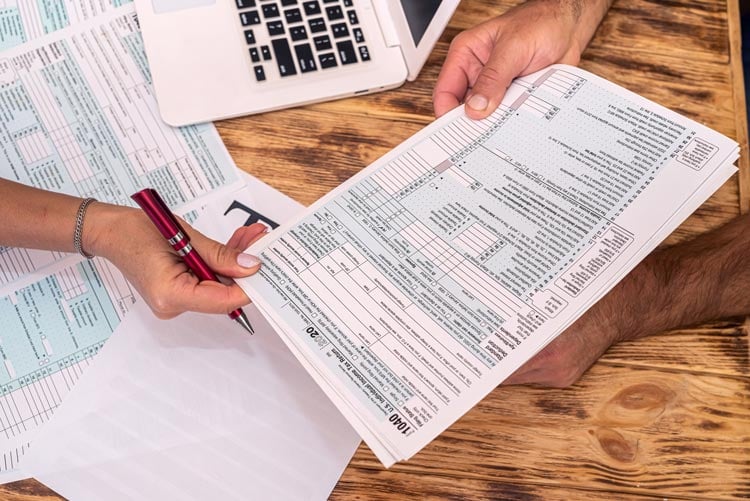
Any tax return is subject to audit by the IRS. However, with limited resources constraining how many audits it can conduct, the IRS likes to focus on returns that show some potential (from the IRS perspective) of hitting pay dirt. As a result, the IRS audits fewer than four of every 1000 returns. Eighty-five percent of those audits are simple computer-generated requests for additional documentation. However, it's worth noting that the 2022 Inflation Reduction Act included funding for increased enforcement so that the numbers may change in the future.
While wealthy taxpayers (millionaires) have approximately a one percent chance of being audited (either through correspondence or by contact with an enforcement agent), low-income taxpayers claiming the earned income tax credit have a 13 percent chance of receiving questions from the IRS. However, taxpayers with high business or farm income (over $200,000) have slightly lower audit odds than low-income taxpayers. Nevertheless, some actions can trigger an audit, including:
- Failing to report all income
- Math errors
- Higher than average deductions or losses
- Higher than expected charitable deductions compared to income
- Operating a business
- Claiming business losses for hobby expenses
- Claiming large rental losses
- Incorrectly reporting the Health Premium Tax Credit
- Taking an early withdrawal from a 401(k) or IRA
- Conducting digital asset and virtual currency transactions
- Underreporting gambling wins or overreporting gambling losses
- Claiming a research and development credit
Some 1031 exchanges have red flag issues for the IRS
A 1031 exchange is a tool that a taxpayer may use to reinvest the proceeds from selling real estate in “like-kind” property while deferring the recognition and payment of the capital gain from the sale. For example, suppose you want to sell your office building and replace it with an apartment complex. If you purchased the office building for $500,000 three years ago and can now sell it for $800,000, that is a potential capital gain of $300,000. If you structure the office building sale and purchase of the apartment complex using a 1031 exchange, you can defer the taxes due on that gain. You may also delay a depreciation recapture payment.
A 1031 exchange can be tricky, and the taxpayer must carefully follow the IRS rules to succeed. Failure to do so can bring a disqualification of the exchange attempt. Some of the challenging provisions include these:
- Tight timelines. The investor must complete the 1031 exchange within 180 calendar days after selling the original (relinquished) property. Within those 180 days is a secondary deadline of 45 days for identifying potential replacements. The taxpayer must inform the Qualified Intermediary of the possible replacements, following this formula:
- Three properties rule. The taxpayer can identify three potential acquisitions without limit on the individual or aggregate value.
- 200 percent rule. The taxpayer can identify any number of potential replacements, but the combined value of all may not exceed 200 percent of the value of the relinquished asset.
- 95 percent rule. The taxpayer can identify any number of properties with any individual or combined value but must acquire 95 percent of the aggregate identified property value before the deadline.
- Engaging a Qualified Intermediary. In addition to serving as the recipient of the potential replacement properties, the Qualified Intermediary must maintain a separate account to safeguard the proceeds until the replacement property’s acquisition. This role is vital since the taxpayer may not have access to the funds during the exchange period. A Qualified Intermediary can’t be related to the taxpayer, a close business associate, or an agent. That exclusion means taxpayers can't use their attorney, accountant, or broker for this crucial job.
- Like-kind exchange. The IRS is lenient in its definition of "like-kind" in the sense that it typically allows almost any exchange of investment and business property. For example, you can swap a residential rental for a solar farm, a restaurant for a self-storage facility, or an industrial complex for a hotel. However, it is strict about the definition of investment property. You may not exchange a personal residence, and you must hold the property for two years before trading it, so house flippers may not execute the exchange for a flip. Having property for sale (as in flipping) does not meet the IRS' definition of business or investment property.
- Matching the value and debt level. The replacement property (or properties) must have the same or greater market value as the relinquished asset. In addition, if the original property is encumbered, the replacements must carry an equal debt level.
As with most audit flags, the 1031 exchange is worth including due to the potential tax relief. Similarly, as with other potential audit flags, taxpayers should maintain excellent records to support the deductions, credits, and deferrals they claim.
This material is for general information and educational purposes only. Information is based on data gathered from what we believe are reliable sources. It is not guaranteed as to accuracy, does not purport to be complete and is not intended to be used as a primary basis for investment decisions. It should also not be construed as advice meeting the particular investment needs of any investor.
Realized does not provide tax or legal advice. This material is not a substitute for seeking the advice of a qualified professional for your individual situation.
Costs associated with a 1031 transaction may impact investor's returns and may outweigh the tax benefits. An unfavorable tax ruling may cancel deferral of capital gains and result in immediate tax liabilities.



